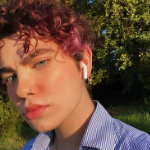Lady Gaga unveiled her insights into the birthing process of Chromatica in Billboard's September 2020 issue: constant dread of existence, countless missed opportunities, as well as worries about the world and its social climate. She also discussed mental healing, the pandemic, and injustices were all related to the release of her sixth studio album.
She revealed that a part of the team lived with her at her Hollywood Hills house during quarantine,“Somebody’d go grocery shopping, the rest of us would clean the vegetables, then somebody would cook”. This type of living was a catalyst to her natural hospitality and kindness.“I run my team like a family [...] I don’t run it like a staff."
But that kindness characterizing her didn't always apply. When it came to herself, she put up a wall against people trying to help her, pulling the “Lady Gaga card” on them. “I’m Lady Gaga, you don’t understand what it feels like [...] I’m so sad, I don’t even know why anymore, why are you making me talk about it?" She recently worked this out in therapy, and her super-producer/friend, Bloodpop, also attempted to help as best as he could. He would have her work on music as an outlet, “Feeling creative always makes [Gaga] happy, so let’s put some studio time on the calendar.”
While Chromatica helped Lady Gaga create an emotional outlet, the album also called her back to her roots. She didn't know at the time that her first hit single,Just Dance, would be the blueprint for her 2020 comeback to pure pop. And more than ever, she encouraged us to dance through our pain and enjoy every personal victory.
“If there’s one glimmer inside you, celebrate it. When you find another one, celebrate it. One more? Call a friend: ‘I did this today. I’m winning."
Plastic Doll, the 9th track on Chromatica, was another callback to her pop roots. The song includes the infamous stuttering vocals and "ooh la la" flourishes she is known for, particularly in older records such as Bad Romance. She explained that she often conversed with her old self when writing a song, “I would cry and go, “There it is — hi! How’s it going? Why do you got to hide?” This practice resulted in the creation of Plastic Doll and many other tracks off the album.
The interview continued on to more schedule-oriented difficulties, fueled by the worldwide pandemic and COVID-19. Her manager, Bobby Campbell, planned Chromatica’s campaign for over a year and that, “All these things were just evaporating before [the team’s] eyes." John Janick, CEO of Interscope, called the campaign, “One of the best rollouts planned for an album, ever."
The album promotion campaign was originally going to be huge, "it was going to feel like a “blockbuster movie coming out," according to Campbell. A surprise performance of Rain on Me was scheduled at a drive-through drag show in Los Angeles; however, the event was cancelled for fear the audience would not abide by the CDC Guidelines of social distancing once they realized who was on stage, such as what happened at a Chainsmoker's concert. The promotion for the album underwent multiple change of plans.“Plan B became Plan C, became Plan D."
In the current climate, Lady Gaga claimed she doesn’t see herself performing at a concert. She has not even started planning for the Chromatica Ball, a mini tour containing six dates in select cities. “I’m going to learn so much from now until the day somebody tells me you effectively can social distance at a stadium,” she said. "I’m going to build a show that’s tailor-made with kindness. [...] we won’t be six feet apart forever.”
Throughout this interview, Lady Gaga gave hints on why social justice, kindness, and equality are so important for her, even though she is aware she has more efforts to make.“When you’re born in this country, we all drink the poison that is white supremacy. I am in the process of learning and unlearning things I’ve been taught my whole life.”
She also discussed activism and the role she believed people should play in it. “Do I think there’s such a thing as performative activism? Yes. Do I think there’s been true activism that’s been very important and needed? Yes. Do I believe Black lives matter? Yes. Do I believe this is going to get louder? Yes. Do I believe it should? Yes.”
Over the course of summer 2020, she gave control of her Instagram stories to Black Lives Matter activists. She also commissioned Honey Dijon, a trans woman of color, to remix Free Woman--an anthem about owning the dancefloor you fought for. “All music is Black music. That’s just a fact.”
Lady Gaga shot the video for 911 back in August, and she vividly remembered feeling truly alive. Filming the video required her to revisit the dark place she was in when she wrote the song, “Freedom for me is when I can go to the darkest part of my heart, visit things that are hard and then leave them behind."
Read the full article by Nolan Feeney here.




